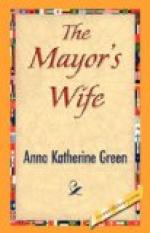But I have grown wary and must make myself sure. Do I find a word in which this combination of. > .[-] occurs twice, as sometimes happens with the th we are considering? No, but I find two other instances in which like contiguous symbols do appear twice in one word; the .< .[-] in No. 3 and the .V .)C in No. 4—a discovery the most embarrassing of all, since in both cases the symbols which begin the word are reversed at its end, as witness: .V .)C — — — )C .V — .< .[-] — — — .[-] .<. For, if .V )C stands for th, and the whole word showed in letters th- — -ht, which to any eye suggests the word thought, what does .< .[-] stand for, concerning which the same conditions are observable?
I could not answer. I had run on a snag.
Rules which applied to one part of the cipher failed in another. Could it be that a key was necessary to its proper solution? I began to think so, and, moreover, that Mrs. Packard had made use of some such help as I watched her puzzling in the window over these symbols. I recalled her movements, the length of time which elapsed before the cry of miserable understanding escaped her lips, the fact that her dress was torn apart at the throat when she came out, and decided that she had not only drawn some paper from her bosom helpful to the elucidation of these symbols, but that this paper was the one which had been the object of her frantic search the night I watched her shadow on the wall.
So convinced was I by these thoughts that any further attempt to solve the cryptogram without such aid as I have mentioned would end by leaving me where I was at present,—that is, in the fog,—that I allowed the lateness of the hour to influence me; and, putting aside my papers, I went to bed. If I had sat over them another hour, should I have been more fortunate? Make the attempt yourself and see.
CHAPTER XXII
MERCY
“Where is my wife?”
“Sleeping, sir, after a day of exhausting emotion.”
“She didn’t wire me?”
“No, sir.”
“Perhaps she wasn’t able?”
“She was not, Mayor Packard.”
“I must see her. I came as soon as I could. Left Warner to fill my place on the platform, and it is the night of nights, too. Why, what’s the matter?”
He had caught me staring over his shoulder at the form drawn up in the doorway.
“Nothing; I thought you had come alone.”
“No, Mr. Steele is with me. He joined me at noon, just after I had telegraphed home. He has come back to finish the work I assigned him. He has at last discovered—or thinks he has—the real author of those libels. You have something special to say to me?” he whispered, as I followed him upstairs.
“Yes, and I think, if I were you, that I should say nothing to Mrs. Packard about Mr. Steele’s having returned.” And I rapidly detailed the occurrence of the afternoon, ending with Mrs. Packard’s explanation to her servants.




